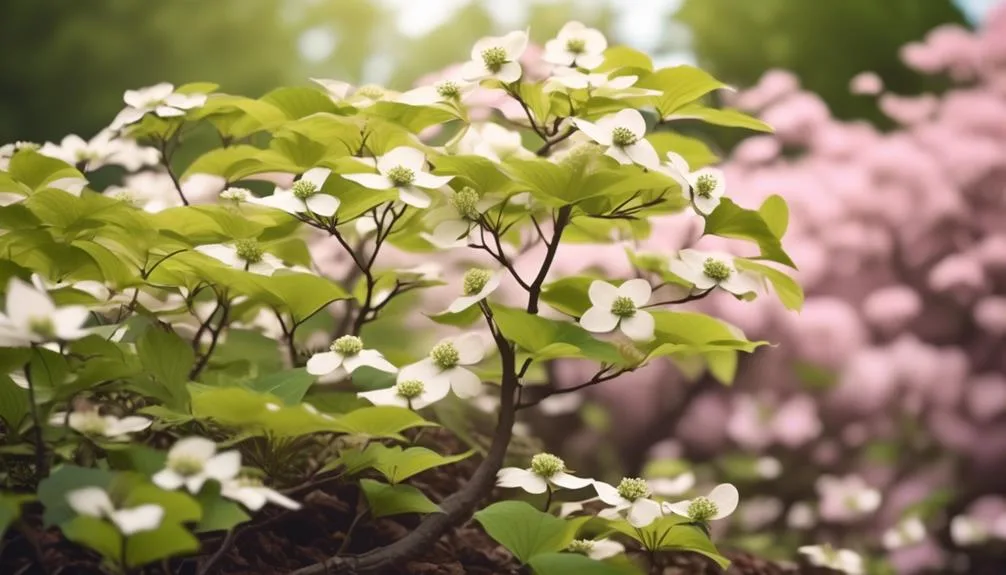If you have a dogwood tree, you may face issues with tree diseases. But you can handle these naturally in an effective and eco-friendly way.
By recognizing common diseases and using organic treatments, you can maintain the health of your dogwood trees.
Let's look into natural methods to fight these diseases and ensure your dogwood trees remain strong and healthy for years to come.
Identifying Dogwood Tree Diseases
If you notice unusual spots or discoloration on your dogwood tree's leaves, it could be a sign of a potential disease. Early detection is key to managing these issues effectively. Keep an eye on the leaves, branches, and overall appearance of your tree.
Look out for powdery mildew, spot anthracnose, or dogwood anthracnose, which are common diseases affecting dogwood trees. Proper diagnosis is crucial in determining the best course of action. If you suspect an issue, consult with a professional arborist or horticulturist to accurately identify the problem.
They can provide guidance on treatment options and help prevent the disease from spreading. By catching and addressing diseases early, you can help your dogwood tree stay healthy and vibrant for years to come.
Natural Prevention Methods
To naturally prevent diseases in your dogwood tree, consider incorporating beneficial native plants into your garden landscape. Native plants can attract natural predators of harmful pests, helping to maintain a healthy balance in your garden ecosystem.
Additionally, these plants can improve soil health and provide natural remedies to keep your dogwood tree strong and resilient. Practicing holistic care for your garden, such as using organic fertilizers and natural pest control methods, can also contribute to disease prevention in your dogwood tree.
Organic Treatment Options
Consider incorporating organic treatments, such as neem oil or compost tea, to help manage and treat diseases in your dogwood tree. These organic options provide effective biological control and are gentle on the environment. Neem oil, derived from the neem tree, acts as a natural insecticide and fungicide, targeting pests and diseases that affect dogwood trees. Compost tea, made from compost and water, contains beneficial microorganisms that can help suppress harmful pathogens and boost the tree's immune system. Additionally, herbal remedies like garlic and chamomile can also be used to create natural sprays that deter pests and combat infections. Here's a table to summarize these organic treatment options:
| Treatment | Description | Benefits |
|---|---|---|
| Neem Oil | Natural insecticide and fungicide from neem tree | Effective against pests and diseases |
| Compost Tea | Contains beneficial microorganisms from compost | Suppresses pathogens and boosts tree's health |
| Herbal Sprays | Made from garlic and chamomile to deter pests | Natural and eco-friendly pest control |
Cultural Practices for Disease Management
Ready to implement some practical techniques to keep your dogwood tree healthy? Let's explore cultural practices for disease management that can complement the organic treatments we've discussed.
First, consider soil amendments. Ensuring your dogwood tree is planted in well-draining, nutrient-rich soil can significantly improve its disease resistance. Adding organic matter like compost or well-rotted manure can enhance the soil structure and promote beneficial microbial activity, creating an environment that's less hospitable to pathogens.
Additionally, proper pruning techniques are vital for disease management. Regularly remove dead or diseased branches to prevent the spread of infections and improve air circulation within the canopy. This promotes overall tree health and reduces the risk of diseases taking hold.
Maintaining Healthy Dogwood Trees
Ensure your dogwood tree remains healthy by regularly inspecting for signs of disease and promptly addressing any issues that arise. Here are some tips to help you maintain the health of your dogwood tree:
- Pruning Tips: Regularly prune your dogwood tree to remove dead or diseased branches, ensuring proper airflow and sunlight penetration.
- Soil Health: Keep the soil around your dogwood tree healthy by mulching to retain moisture and improve soil structure. Consider periodic soil testing to monitor and adjust nutrient levels as needed.
- Adequate Watering: Water your dogwood tree deeply and regularly, especially during dry periods, to keep the soil consistently moist but not waterlogged.
- Pest Control: Keep an eye out for pests and take appropriate measures to control infestations, such as using natural predators or organic insecticides.
- Regular Inspections: Regularly inspect your dogwood tree for any signs of disease, such as leaf discoloration or abnormal growth, and take action promptly.
Conclusion
In caring for your dogwood trees, identifying and preventing common diseases, utilizing organic treatments, and maintaining their health are key.
By practicing natural and cultural management methods, you can ensure the longevity and beauty of your trees.
Remember, a little care today yields healthy, flourishing dogwood trees tomorrow.
Happy gardening!

My interest in trees started when I first saw the giant sequoias in Yosemite.
I was a teenager then, and I remember thinking, “I need to learn more about this.”
That moment stuck with me.
A few years later, I went on to study forestry at Michigan Tech.
Since graduating, I’ve worked in a mix of hands-on tree care and community education.
I’ve spent over ten years helping people understand how to plant, maintain, and protect the trees in their neighborhoods.
I don’t see trees as just part of the landscape.
They are living things that make a real difference in our daily lives.
